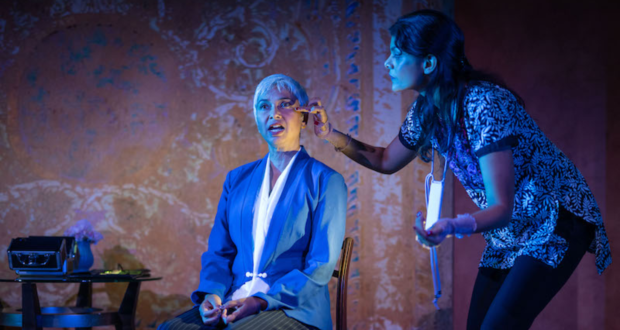With gripping writing and powerful performances, Deepika Arwind’s intense and eerie political drama lays bare the fear and division of contemporary politics, whilst delivering a message that is universally relevant.Summary
Rating
Excellent
Deepika Arwind, an award-winning international playwright, originally from Bangalore, is a rising talent with an interesting resume, including being playwright-in-residence at Jagriti, part of The International Conference on Insecurity. Her play Phantasmagoria “explores the dangers of divisive politics” so as someone with an interest in political theatre I jumped at the chance to see it.
Phantasmagoria is a claustrophobic drama set in the green room before a political debate between a student radical and an establishment politician. The tension rises, from barbed initial pleasantries to a physical altercation, throughout the play’s 90 minutes.
The four characters are broad political archetypes. Mehrosh, a student radical, stands in for the left, the young, the disaffected, the passionate. Bina, a wily politician, stands in for the right, the conservative, the reactionary. Jai, a journalist, represents the centre, the high minded, those who care more about the tone than the content of debate. Scherezade, Bina’s assistant, represents the voters, drawn to the reactionary politician with the promise of collective dignity. All deliver strong performances especially Hussina Raja as Mehrosh and Ulrika Krishnamurti as Scherezade.
Phantasmagoria is set in a fictional country, but due to Arwind’s background it is easy to read it as a play about India, where populist and Hindu nationalist politics dominate through what Alexis de Tocqueville called the tyranny of the majority. On this level, the play is a tense and fascinating window into the politics of another country.
One of the great strengths of Phantasmagoria is that this could also be the green room of the BBC. Mehrosh could be Greta Thunberg, Bina could be Suella Braverman. Jai could be James O’Brien. Scherezade could be plucked from a Question Time audience. The drama of Phantasmagoria has a universal political message: we are all divided and scared. A reference to a recent US political debate, underlines that these are universal divisions.
The universal message is enhanced by the fact that we learn little about the characters’ specific views. We are not explicitly told that Bina is a Hindu nationalist. Mehrosh is writing her university dissertation on the impact of environmental change on marginalised communities, but we are not told she is a Muslim or a member of another religious minority. Through the difference in age, dress, language, accents and behaviour we project our own understanding of politics onto the characters.
Aside from the political drama, there is a rising sense of the eerie throughout Phantasmagoria. The debate is being broadcast from an isolated farmhouse and the gradual sense that there is more present than political animosity builds throughout the play. A story about a caged leopard was kept in the property is genuinely macabre. The nods towards the horror genre further underlines the play’s theme of fear of the other. In the final scene, the use of silence, shadow and sound builds this eerie tension to nail biting intensity.
Both the political tension and the eerie sense of something being wrong builds throughout the show, however, the climactic moments do not fully pay off the tension created. It is not horrific enough for the eerie tension or raw enough for the political tension. External political pressure that is building on the characters is also not resolved.
Phantasmagoria describes itself as a psychological horror story. It balances politics and horror well, using all elements to illuminate the themes of division and fear. Arwind is certainly a talented writer, as this play has a strong message delivered through intense drama.
Written by Deepika Arwind
Directed by Jo Tyabji
Phantasmagoria plays at Southwark Playhouse until 25 November. Further information and bookings can be found here.
 Everything Theatre Reviews, interviews and news for theatre lovers, London and beyond
Everything Theatre Reviews, interviews and news for theatre lovers, London and beyond



